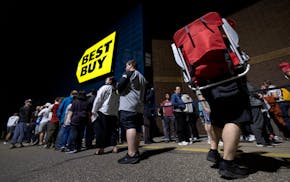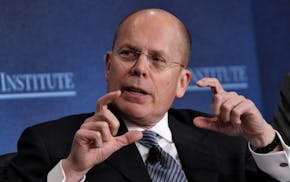The U.S. needs global trade. However, the country needs to be smart about the policies around it, including tariffs, one local expert says.
Scott Martens — who cut his supply-chain chops in the military, worked for Twin Cities companies and now is a University of St. Thomas professor — says the discussion around supply chains and tariffs needs to include national security implications.
A former Navy officer, Martens flew S-3B Viking multimission jets off carriers USS Enterprise and USS Nimitz in the first Gulf War. After teaching at the University of Minnesota, the Iowa State University graduate now is a professor of supply chains and business analytics at St. Thomas' Opus College of Business and a consultant.
We asked him about the current tariff uncertainty, especially in regard to China, and its effects on the supply chain. The interview has been edited for length and clarity.
Q: How are tariffs today different than the supply-chain crisis that occurred during the COVID-19 pandemic?
A: I like to say COVID-19 was as much a supply-chain crisis as it was a health care crisis. Today, I like to say tariffs are not only about economic security but also national security. And what do both COVID and tariffs have in common? They impact global supply chains.
I often say, Americans will not fully appreciate the national security aspect of tariffs and global trade, until one day their iPhones no longer work — because our adversaries have shut down critical supplies.
Tariffs are not only an economic play but also a national security play that requires us to fundamentally and strategically rethink our sources of supply and the supply chains that move them.
Q: Where do you fall on international trade?
A: I'm an old Navy guy. Global trade keeps the U.S. Navy in business. My dad always used to poke fun by asking me why I drove a VW and Mazda. I told him as a Navy guy, it was for job security!
Bottom line: I'm all about global, free and fair trade, but I think the U.S. needs to have smart global trade. We can no longer have predominantly sole sources of supply and critical sources of production running through our adversaries. The risk to national security is unacceptable.
Q: How do tariffs impact a company's supply chain?
A: We live in a capitalistic society. Capitalism is not perfect, but the best system out there. It's based upon sending signals via price in the marketplace. Tariffs are a price signal imposed by the government on trade. As tariffs increase, public companies, which have their goal of making money for shareholders as their primary purpose of existence, are incented via the tariff signal to seek alternative sources of "cheaper" supply.
Q: For decades, businesses have been moving to a just-in-time inventory system that's highly dependent on concentrating supply chains. Do you see that philosophy changing?
A: I like to think of inventory philosophy like a pendulum. The pendulum swings between just in time and just in case.
For decades, companies have been obsessed with driving cost out via lean thinking, which results in a just-in-time philosophy.
During extreme events — COVID, weather events, earthquakes, labor strikes and now tariffs — there is a price to be paid for running too lean. Since COVID, we have seen more companies begin to carry a bit of excess inventory (just in case) to cover for unplanned, disruptive events in the supply chain.
There is a financial risk of carrying too much inventory and there is a financial risk of carrying too little inventory — being out of stock (loss of market share). Those risks must be balanced.
Q: How can risks around supply chains be mitigated?
A: To mitigate these risks we must develop smart, strategic supply chains. Businesses working with government must identify critical sources of supply and map out the supply chains to understand the complex web of interdependencies. The U.S. should set a percentage exposure limit of strategic sources of supply that can run through adversaries. Any level above that limit must either be reshored to the U.S. or offloaded to approved allies.
Q: Does the Navy still have a role in protecting free trade?
A: Global trade is not going away. It will change based on rethinking our strategic supply chains. Since international trade is not going away, there must be freedom of navigation for our trade on the high seas. This requires a strong, powerful blue-water Navy. Ninety percent of global trade transits on the high seas. Freedom of navigation is the benchmark for globalization and international trade.
Q: What about companies that switched some of their manufacturing away from China because of the tariffs during Trump's first term and COVID-19 issues, but now must face new tariffs where they shifted manufacturing?
A: Be flexible, have options. Multisource from multiple countries. Think of it like a food company. If you look at ingredients on the back of a food box, it says "may contain xxxx." That gives them the ability to substitute as prices increase or sources of supply chain change. Nonfood companies need to use multisourcing and use this concept to control risk. One such risk is price.

UnitedHealth sues the Guardian, alleging defamation in coverage of nursing home care

Prices for international flights drop as major airlines navigate choppy economic climate
Minnesota's med spa industry rises in popularity — and with little regulation

Hundreds line up at Best Buy to nab Nintendo Switch 2, in scene like '90s opening parties

